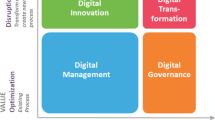Abstract
Innovation and entrepreneurship education is one of the hot areas of higher education research and practice in China in recent years. Internet innovation and entrepreneurship can be taken as a new direction which can also provide a new development opportunity and change path for the theoretical research and application practice of contemporary innovation and entrepreneurship education in China. Based on the analysis of the concepts, characteristics and development status of Internet innovation and entrepreneurship education in China, this paper focuses on the implementation strategies of Internet innovation and entrepreneurship education, including the basic contents of curriculum setting, teaching method reform, teacher team building, Internet innovation and entrepreneurship practice. Finally, the paper further discusses how to improve the problems involved in Internet innovation and entrepreneurship education in China.
Similar content being viewed by others
References
Bai, X. G. (2016). Evolution and enlightenment of innovation and entrepreneurship education in China since reform and opening-up. Journal of National Academy of Education Administration,2, 67–71.
Cai, Y. Z. (2016). Opportunities and challenges of innovation and entrepreneurship in “Internet+” action: An analysis from the perspective of technological revolution and technology economy paradigm. Seeking Truth,43(3), 43–52.
Cai, L., & Shan, B. A. (2010). The impact of venture network on new enterprise performance: An empirical analysis based on the establishment period, survival period and growth period. Journal of Sun Yat-sen University (Social Science Edition),50(4), 189–197.
Chen, X. H., Feng, Z. Y., & Yu, W. W. (2016). Business model transition of enterprises under internet thinking. Business Economic Research,10, 87–88.
Cheng, H. L. (2017). Implementation strategy of innovation and entrepreneurship education in Colleges and Universities under the background of “Internet+”. Journal of National Academy of Education Administration,5, 76–81.
Council, N. (2013). Education for life and work: Developing transferable knowledge and skills in the 21st century. Washington, DC: National Academies Press.
Drucker, P. (2014). Innovation and entrepreneurship. Abingdon: Routledge.
Fan, L. M. (2016). Core literacy of innovation and entrepreneurship: Theoretical research and practical exploration—taking Shanghai University of Finance and Economics as an example. China Higher Education Research,10, 83–87.
Feng, C. Y. (2017). The application of experiential teaching method in innovation and entrepreneurship education. Journal of National Academy of Education Administration,7, 68–73.
Gibb, A. A. (1994). Do we really teach (approach) small business the way we should? Journal of Small Business and Entrepreneurship,11(2), 11–27.
Griffin, P., & Care, E. (Eds.). (2014). Assessment and teaching of 21st century skills: Methods and approach. Berlin: Springer.
Gu, M. Y. (2015). Core literacy: The motive force of curriculum reform. People’s Education,13, 17–18.
Haina, B. (2018). China university students entrepreneurship report 2017. Retrieved May 20, 2019 from http://wemedia.ifeng.com/45959747/wemedia.shtml.
Han, W., & Ouyang, Q. (2007). Tsinghua University: Integrating entrepreneurship education into career counseling. Employment of Chinese College Students,10, 26.
Hong, D. Y. (2016). Creating an upgraded edition of innovation and entrepreneurship education. China Higher Education,2, 47–49.
Hu, B. B., Wang, S. G., & Ren, J. J. (2016). New characteristics of entrepreneurship in the Internet era: Exploratory research based on entrepreneurship by entrepreneurs. Pioneering with Science and Technology Monthly,29(18), 27–32.
Huang, R. X., Wang, Z. W., & Ren, G. F. (2017). The dilemma and solutions of innovation and entrepreneurship education in medical colleges and universities. Innovation and Entrepreneurship Education,8(3), 77–79.
Huang, Z. X., Zhao, G. J., & Tang, W. J. (2015). On the transformation and development of entrepreneurship education in colleges and universities in the era of group innovation. Educational Research,36(7), 34–39.
Jiang, Y. (2015). Intelligent vacuum furnace. Prosecutorial View,5, 96.
Kang, G. D., & Zhang, Y. L. (2016). Practice of innovation and entrepreneurship training in Jishou University under the background of “Internet+”: Practice Teaching Reform of discrete structure course of software engineering major. Higher Education Journal,12, 22–23.
Lao, B., & Wu, G. (2018). Research on experimental teaching model of innovation and entrepreneurship in university of economics and management: Take design and practice of business plan as an example. Paris: Atlantis Press.
Li, C. Y., Yang, J. H., & Deng, Z. L. (2002). Idea of developing innovation and entrepreneurship education. Invention and Innovation,6, 22.
Liu, Y. B., Ouyang, C. P., & Yang, X. H. (2016a). Exploration of computer innovation and entrepreneurship training mode in the era of “Internet+”. Higher Education Journal,14, 15–16.
Liu, G. F., Zhang, Y., & Feng, H. (2016b). Review of core literacy research. Educational Guide,3, 5–9.
Lu, D. X. (2017). Research on innovation and entrepreneurship education in higher vocational colleges under the background of “Internet+”. Guangxi Education,19, 28–29.
Ma, X. H. (2014). Eco-civilization of entrepreneurship education. Education and Occupation,20, 95–97.
Ma, H. T. (2016). Suggestions on promoting China’s economic and social innovation and development driven by “Internet+”. China’s Science and Technology Industry,3, 38–39.
Science Press. (2018). Innovation and entrepreneurship of college students in the “Internet+” era. Retrieved May 20, 2019 from http://www.sohu.com/a/243645883_410558.
Sun, H. Y. (2010). Four basic issues in the cultivation of innovative talents: Exploration of “3.3.3” curriculum system and 7P teaching mode. Innovation and Entrepreneurship Education,1(2), 8–14.
Timmons, J. A. (1977). New venture creation a guide to small business development. Irwin: Irwin Professional Publishing.
Wan, L. Y., & Kang, C. P. (2016). Internet+ creator education: Building a new ecology of innovation and entrepreneurship education in colleges and universities. Research on Education Development,36(7), 59–65.
Wang, Z. R. (2015). The overall conception of innovation and entrepreneurship education concept change in Colleges and universities. China Higher Education Research,7, 75–78.
Wikipedia. (2019). Entrepreneurship. Retrieved May 20, 2019 from https://en.wikipedia.org/wiki/Entrepreneurship.
Woshipm. (2016). White paper on internet innovation and entrepreneurship 2016. Retrieved May 20, 2019 from http://www.woshipm.com/it/419120.html.
Wu, A. H., Hou, Y. F., & Hao, J. (2017). Take the “Internet+” double creation contest as the carrier to deepen the innovation and entrepreneurship education reform in colleges and universities. China University Teaching,1, 23–27.
Xue, C. L., Lu, C. C., & Li, D. Z. (2016). Review and reflection on innovation and entrepreneurship education in colleges and universities during the 12th Five-Year Plan period: Based on the analysis of third party evaluation report of higher education. China Higher Education Research,2, 20–28.
Yang, B. (2015). The essence of entrepreneurship education is to educate people and rejuvenate the country. People’s Daily, 19.
Zeng, L., Zhang, Z. Q., & Liu, Y. N. (2012). The strategy of “double-creation” of innovation and entrepreneurship education service in Colleges and universities needs coordinated development. Education Research,38(1), 70–76+105.
Zhan, R., Zhang, K. Z., & Chen, P. L. (2019). Research on the construction of financial experimental teaching system based on innovation and entrepreneurship. Experiment Science and Technology,17(4), 119–124.
Zhang, L. C. (2001). The necessity of alienation of traditional education and the logic put forward by innovative education. Educational Practice and Research,2, 8–10.
Zhang, J., Li, H., & Liu, Y. (2018). Research on the innovative and entrepreneurial ability of higher medical college students: Taking the competition of “Internet+” college students’ innovation and entrepreneurship competition in a medical college as an example. Health Vocational Education,36(6), 10–11.
Zhao, J., & Yang, K. Y. (2016). The research on the functional construction of innovative entrepreneurialinformation platform in internet environment: Such as the college students’ innovative entrepreneurial education. Information Science,34(5), 59–63.
Zheng, Y. L., & Li, L. Y. (2014). Creative-based learning with technical support: Connotation, characteristics and implementation path of creator education in American primary and secondary schools. Open Education Research,20(6), 42–49.
Zhu, Y. X., & Yang, S. B. (1999). Outline of innovative education. Educational Research,8, 8–15.
Acknowledgements
This work was supported by Higher Education Research and Reform Development Project of Nanjing University of Finance and Economics (GJ201823), Higher Education Research and Reform Development Project of Nanjing University of Posts and Telecommunications (JG01118JX68).
Author information
Authors and Affiliations
Corresponding author
Additional information
Publisher's Note
Springer Nature remains neutral with regard to jurisdictional claims in published maps and institutional affiliations.
Rights and permissions
About this article
Cite this article
Sun, D., Li, S. & Xu, X. Analysis of reform and development strategies of China’s Internet innovation and entrepreneurship education. Entrep Educ 3, 77–93 (2020). https://doi.org/10.1007/s41959-020-00024-6
Received:
Revised:
Accepted:
Published:
Issue Date:
DOI: https://doi.org/10.1007/s41959-020-00024-6




